Want to know more about the Best Schools For Renewable Energy Degrees In the US and make an informed decision? Here is a good place to start.
Are you ready to join the ranks of the sun-worshipers, wind-tamers, and water-whisperers? Look no further because we’ve compiled a list of the best schools for renewable energy degrees.
From solar to hydro and everything in between, these institutions are the shining stars of sustainable education. Get ready to harness the power of the elements and charge up your career with renewable energy!
Please note that schools are selected based on our criteria (at the end of the article), ranked by the latest acceptance rate.
Table of Contents
#25. Arizona State University, Tempe


- Acceptance rate: 88%
- Average entry score: 130-170 GRE
- Student-to-faculty ratio: 20 to 1
- Estimated cost of attendance (tuition and fees): $34,208
- Average earning potential for graduates: $75,000 (Payscale)
ASU’s advanced program in renewable energy focuses on the design, analysis, and operation of renewable energy systems. It incorporates the latest technologies and trends in renewable energy as well as an understanding of how to apply these technologies in real-world situations.
This program is designed for individuals who have a strong interest in science, engineering, economics, and policy issues related to renewable energy. Future renewable energy professionals also learn how to develop and implement strategies for integrating renewable energy into existing power systems.
#24. University of Colorado, Boulder

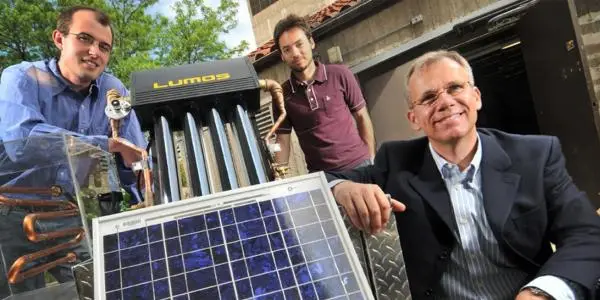
- Acceptance rate: 84%
- Average entry score: 162-168 GRE
- Student-to-faculty ratio: 17 to 1
- Estimated cost of attendance (tuition and fees): $32,349-$58,167
- Average earning potential for graduates: $62,000-$101,000 (Payscale)
Clean energy students learn from faculty members who are experts in the field and have many years of experience.
The University of Colorado, Boulder, offers studies leading to a master’s degree in renewable and clean energy. With a unique focus on the intersection of technology and business, the program provides students with a wide range of skills to meet today’s needs.
The curriculum includes courses in wind power energy, solar photovoltaics, sustainable transportation, power electronics, and smart grids. Students are encouraged to participate in research projects as part of their degree program by working with faculty members on renewable energy-related projects.
#23. Washington State University


- Acceptance rate: 80%
- Average entry score: 147-153 GRE
- Student-to-faculty ratio: 15 to 1
- Estimated cost of attendance (tuition and fees): $28,669-$43,985
- Average earning potential for graduates: $57,000-101,000( Payscale)
Washington State University employs a unique approach to energy education. The school offers a full-time Energy Program that includes courses in wind technology, solar and geothermal energy.
Students can also take a semester-long course in renewable energy or earn an undergraduate certificate in the subject.
The WSU energy program teaches students about the technology and policy behind renewable energy. Students are prepared for careers in the industry through training in fields such as engineering, business, and law.
#22. University of Tennessee, Knoxville


- Acceptance rate: 78%
- Average entry score: 155 GRE
- Student-to-faculty ratio: 17 to 1
- Estimated cost of attendance (tuition and fees): $32,658-$50,848
- Average earning potential for graduates: $56,000-$102,000 (Payscale)
The University of Tennessee partners with other universities, government agencies, and industry organizations to research renewable energy and sustainability. This institution trains students in solar, wind, and fuel cell technology.
Students have the opportunity to conduct research with faculty members and graduate students, as well as with industry partners. This way, students can gain experience working in an industry setting and develop a network of contacts.
Similar articles like this:
- 25 Best Forestry Schools In The US
- 25 Best Schools For Environmental Science In The US
- 25 Best Schools For Health Sciences Degrees In The US
#21. University of Minnesota, Twin Cities


- Acceptance rate: 70%
- Average entry score: 153-160 GRE
- Student-to-faculty ratio: 17 to 1
- Estimated cost of attendance (tuition and fees): $23,110-$52,088
- Average earning potential for graduates: $61,000-$117,000 (Payscale)
The University of Minnesota, Twin Cities puts students in the driver’s seat of their own education. With an average class size of 24 students and a student-to-faculty ratio of 17:1, you will have more opportunities for individualized attention from instructors.
Renewable energy students will be able to take advantage of the school’s cutting-edge research and development facilities. The university also boasts an impressive list of employers who hire renewable energy graduates from this program.
This school’s Career Services department provides career-planning services, including mock interviews, résumé reviews, and more.
#20. Ohio State University


- Acceptance rate: 68%
- Average entry score: 157-170 GRE
- Student-to-faculty ratio: 18 to 1
- Estimated cost of attendance (tuition and fees): $29,368-$52,451
- Average earning potential for graduates: $105,653 (Glassdoor)
OSU introduces students to renewable energy in the first year of their undergraduate program. The course covers geography, politics, economics, and environmental science. Students learn about existing technologies for renewable energy and how they work.
Later in the program, students take courses such as energy policy and financing. Finally, students are prepared to enter the job market through a capstone project that allows them to gain experience with renewable energy.
#19. Purdue University, West Lafayette

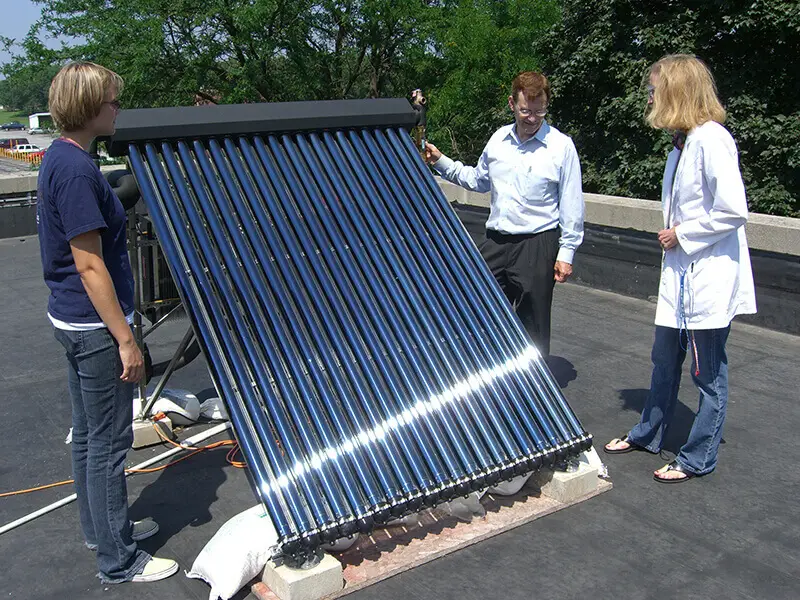
- Acceptance rate: 67%
- Average entry score: 162 GRE
- Student-to-faculty ratio: 14 to 1
- Estimated cost of attendance (tuition and fees): $24,390-$50,000
- Average earning potential for graduates: $63,000-$106,000
Purdue University in West Lafayette, Indiana is an exceptional institution for students who aspire to pursue a career in renewable energy.
The University offers innovative programs that meet the needs of students from all educational backgrounds, whether pursuing a degree in energy engineering or a graduate degree in sustainable energy.
In addition, Purdue University has state-of-the-art research facilities that put students at the forefront of renewable energy. Graduates of Purdue University’s renewable energy programs are in high demand and have a plethora of career opportunities available to them.
So, Purdue University in West Lafayette, Indiana, is a great choice for students seeking an education dedicated to renewable energy.
#18. University of Houston


- Acceptance rate: 63%
- Average entry score: 155 GRE
- Student-to-faculty ratio: 21 to 1
- Estimated cost of attendance (tuition and fees): $27,248-42,488
- Average earning potential for graduates: $54,000-$104,000 (Payscale)
The University of Houston provides programs in sustainable energy that are ideal for students who want to learn about the field. While students can earn a degree in sustainable energy, they can also take classes on the subject as part of a broader curriculum.
UH’s graduate programs offer both master’s and doctoral degrees in this field.
Students learn from faculty who are experts in their fields, and these professors bring real-world experience to the classroom. They are able to share their knowledge with students so that they can succeed in their careers.
Similar articles like this:
- 25 Best Immunology Schools In The US
- 25 Best Microbiology Schools In The US
- 25 Best Education Schools In The US
#17. Texas A&M University College Station

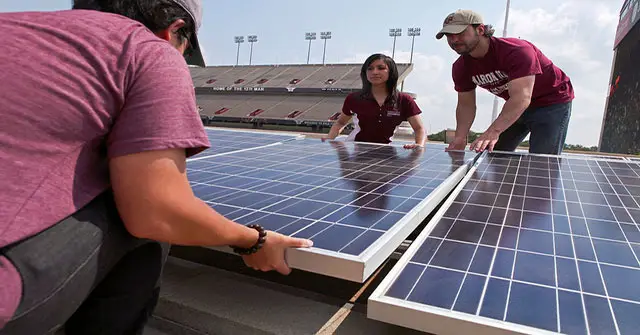
- Acceptance rate: 63%
- Average entry score: 146 GRE
- Student-to-faculty ratio: 21 to 1
- Estimated cost of attendance (tuition and fees): $30,608-$58,976
- Average earning potential for graduates: $77,031 (Payscale)
This institution, through the Department of Ocean Engineering, shifts focus from traditional engineering topics to the broader ocean engineering problem, emphasizing the need for a systems approach. Students learn how to solve problems at the interface of ocean engineering and marine science.
As the need for energy continues to grow, the demand for renewable energy professionals is expected to increase. Graduates of this energy program will have the skills and knowledge to help meet the growing demand for renewable energy.
They’ll learn how to design, build, operate, and maintain systems that produce power from the ocean.
#16. University of Illinois at Urbana-Champaign

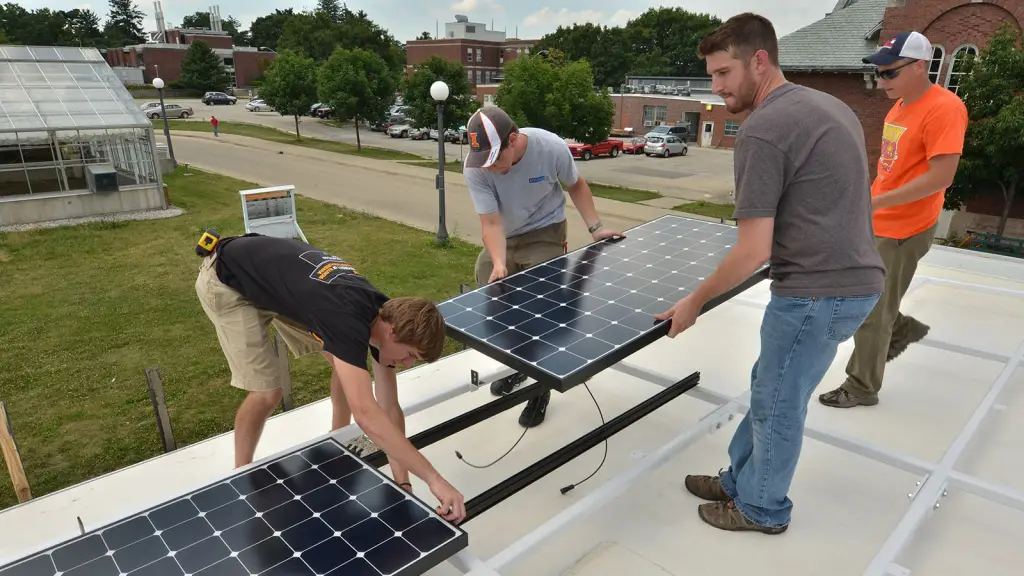
- Acceptance rate: 63%
- Average entry score: 152 GRE
- Student-to-faculty ratio: 21 to 1
- Estimated cost of attendance (tuition and fees): $33,060-$50,510
- Average earning potential for graduates: $79,117 (UIUC)
UIUC is involved in research and development of new technologies to improve renewable energy production and use. The Master of Energy Engineering course offers students the opportunity to study renewable energy theory and application.
This program provides students with a broad range of knowledge and skills in the areas of energy planning, management, and policy.
At UIUC, you’ll also learn more about the sustainable energy industry, engineering for sustainable systems, and environmental policy. At the end of this program, you’ll have the skills to work in a variety of positions related to renewable energy.
#15. University of Wisconsin, Madison


- Acceptance rate: 57%
- Average entry score: 163 GRE
- Student-to-faculty ratio: 18 to 1
- Estimated cost of attendance (tuition and fees): $27,484-$55,372
- Average earning potential for graduates: $62,000-$98,000 (Payscale)
The University of Wisconsin-Madison is also an excellent choice for renewable energy degrees due to its top-rated academic programs, state-of-the-art facilities, real-world opportunities, and a culture that values sustainability.
Students can expect a quality education, access to cutting-edge research, and a community passionate about creating a cleaner, greener future.
#14. University of Washington, Seattle


- Acceptance rate: 56%
- Average entry score: 154-168 GRE
- Student-to-faculty ratio: 9 to 1
- Estimated cost of attendance (tuition and fees): $30,640-$58,470
- Average earning potential for graduates: $78,511 (Payscale)
Future leaders in the energy industry can benefit from a graduate degree in energy at the University of Washington. The school has a strong reputation for its research into sustainable development and renewable energy.
This university is well-known for its clean energy initiative, a research project that aims to develop new technologies and policies to help the U.S. meet its clean energy goals. This program helps students gain a holistic view of how energy works in today’s society and what needs to be done to maintain a sustainable future.
UW-Seattle’s modern classrooms and facilities allow students to study in a state-of-the-art environment that is conducive to learning. The school’s Department of Energy also contributes to this effort by providing students with resources and opportunities to gain experience in the field.
Due to its research-oriented curriculum, UW-Seattle’s School of Energy is a great choice for students who are interested in pursuing careers as engineers or scientists.
Similar articles like this:
- 25 Best Material Science Schools In The US
- 25 Best Schools For Math In The US
- 25 Best Medical Schools In The US
#13. Pennsylvania State University


- Acceptance rate: 55%
- Average entry score: 151-155 GRE
- Student-to-faculty ratio: 14 to 1
- Estimated cost of attendance (tuition and fees): $36,484-$54,062
- Average earning potential for graduates: $66,000-$97,000 (Glassdoor)
At Pennsylvania State University, students are free to choose from a variety of renewable energy programs that offer a wide range of expertise in the field. The university offers graduate certificate courses in solar energy, business sustainability strategy, and sustainability management and policy.
All three certificates are designed to give students a fundamental understanding of the principles governing sustainable energy systems. Students who enroll in the graduate certificate courses will be prepared to work as sustainability consultants or project managers.
#12. University of Maryland, College Park


- Acceptance rate: 51%
- Average entry score: 146-167 GRE
- Student-to-faculty ratio: 18 to 1
- Estimated cost of attendance (tuition and fees): $10,955-50,000
- Average earning potential for graduates: $84,860 (UMD)
Known for the NextGen Energy Program, the University of Maryland is an excellent resource for students who want to pursue a graduate degree in energy.
Energy systems engineering students at UMD are able to focus on the study of energy systems to enhance their knowledge of how to develop and optimize these systems.
The university offers its students the chance to study renewable energy and how it can be used in future power generation. This course also examines how sustainable development can be balanced with economic growth.
#11. North Carolina State University

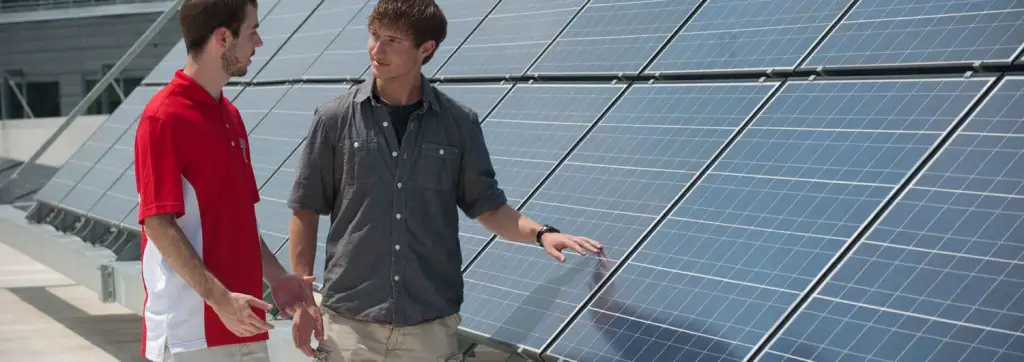
- Acceptance rate: 46%
- Average entry score: 146-155 GRE
- Student-to-faculty ratio: 15 to 1
- Estimated cost of attendance (tuition and fees): $24,986-$45,771
- Average earning potential for graduates: $77,035 (Payscale)
NC State University offers an in-depth graduate course in renewable energy development. The course focuses on the technical aspects of developing and managing renewable energy projects.
Students will learn about the legal issues surrounding renewable-energy development. They also study sustainability and energy policy issues at local and state levels. This online program is offered in a flexible format that allows students to study at their own pace.
NC Clean Energy Technology Center is a resource for students, researchers, and professionals in the clean energy field. It provides information on the latest technologies, trends, and events in clean energy. The center also offers technology demonstrations and workshops.
Graduates of the program can find jobs with utilities, solar installers, and other renewable energy companies. They may also be hired by government agencies or non-profits involved in clean energy policy issues.
#10. University of California, San Diego

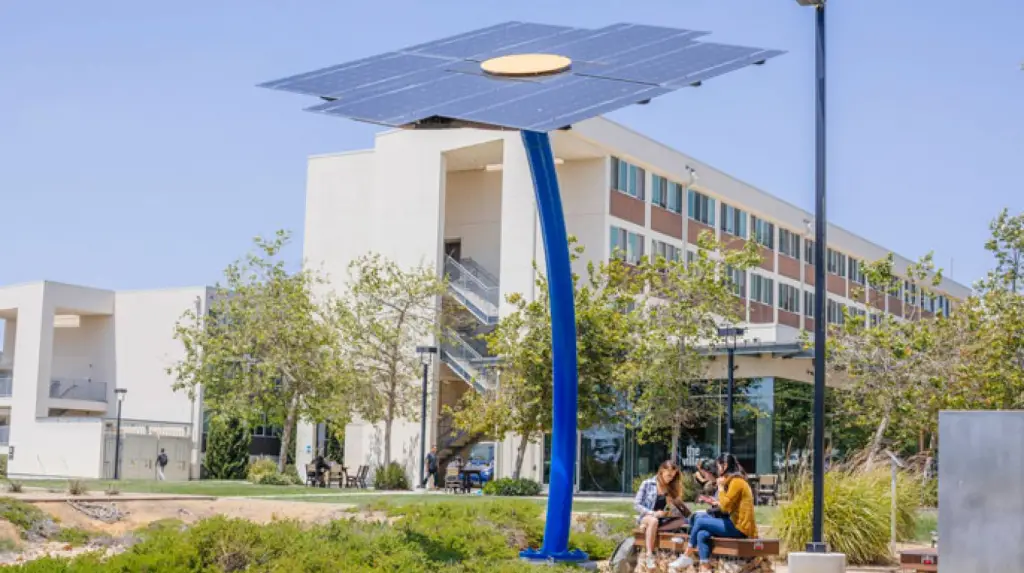
- Acceptance rate: 37%
- Average entry score: 160-162 GRE
- Student-to-faculty ratio: 12 to 1
- Estimated cost of attendance (tuition and fees): $36,061-$65,835
- Average earning potential for graduates: $82,450 (Salary.com)
UCSD leads in combining engineering and science to address the world’s most critical challenges. The campus is situated on 180 acres overlooking San Diego, with opportunities for students to get involved in research from an early age.
Students of the distributed renewable energy resources program will focus on developing an understanding of the technology and economics of these resources. The course blends theoretical and applied science to provide students with a strong background in the fundamentals of renewable energy.
This advanced degree program offers the flexibility to pursue an individualized course of study that fits your academic and professional goals. Upon completion, you will be able to apply for top jobs in the renewable energy industry.
Similar articles like this:
- 25 Best Multidisciplinary Schools In The US
- 25 Best Gerontology Schools In The US
- 25 Best Nursing Schools In The US
#9. University of Texas at Austin

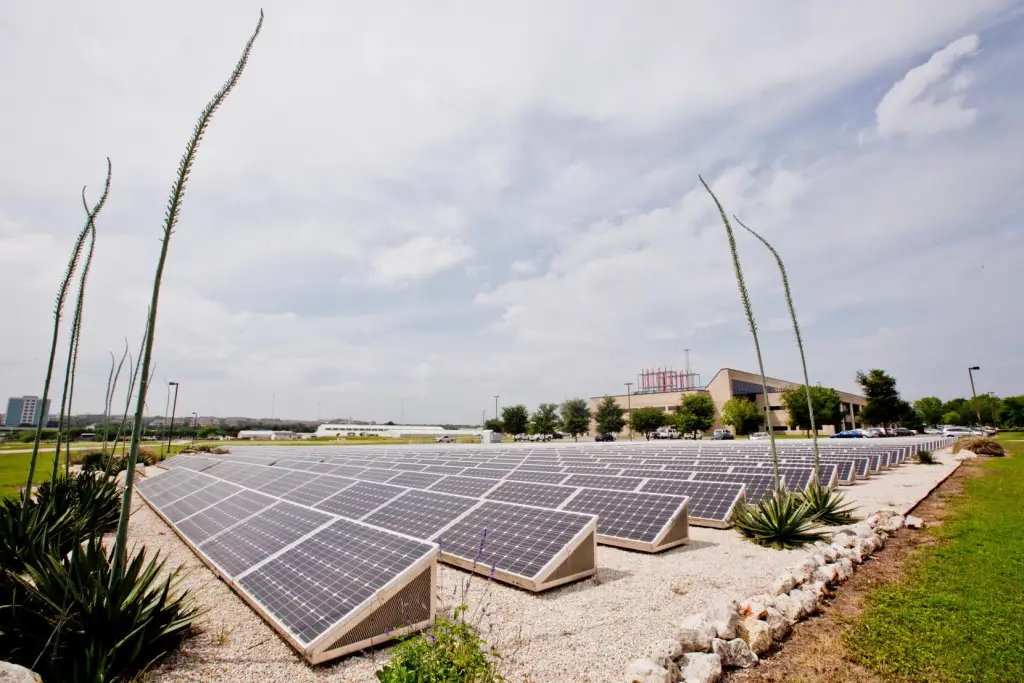
- Acceptance rate: 32%
- Average entry score: 155-160 GRE
- Student-to-faculty ratio: 16 to 1
- Estimated cost of attendance (tuition and fees): $28,928-$57,512
- Average earning potential for graduates: $79,049 (Cockrell School of Engineering)
The Energy Institute at The University of Texas at Austin is a global leader in energy research and education. This group is committed to advancing knowledge and developing innovative technologies.
They aim to educate the next generation of scientists, engineers, entrepreneurs, and policymakers who will lead the world toward a clean energy future.
These energy programs are designed to provide students with the skills they need to pursue careers in the energy industry. They are taught by faculty experts with years of experience working in their respective fields. Plus, the programs are flexible enough to accommodate students looking for a part-time or full-time course load.
#8. University of Michigan, Ann Arbor


- Acceptance rate: 26%
- Average entry score: 154-161 GRE
- Student-to-faculty ratio: 15 to 1
- Estimated cost of attendance (tuition and fees): $32,272-69,326
- Average earning potential for graduates: $67,000-$109,000 (Payscale)
As renewable energy becomes more and more important, so does the need for skilled professionals. The University of Michigan’s sustainable energy systems program provides the knowledge and skills that graduates will need to succeed in a growing field.
These programs are available at both the undergraduate and graduate levels. As a result, students have the option to pursue a bachelor’s degree or master’s degree in sustainable energy systems.
The University of Michigan provides a conducive learning environment for students to gain hands-on experience in the field through internships and research projects.
What’s it like to study at the University of Michigan, Ann Arbor?
#7. Georgia Institute of Technology

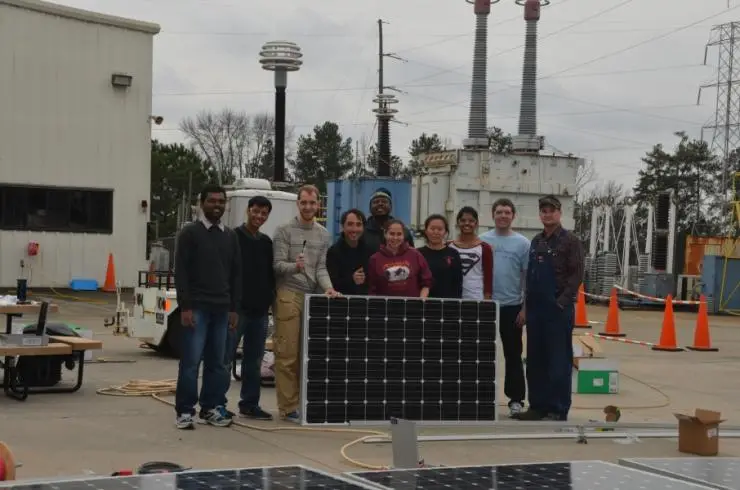
- Acceptance rate: 21%
- Average entry score: 155-166 GRE
- Student-to-faculty ratio: 21 to 1
- Estimated cost of attendance (tuition and fees): $31,898-$53,010
- Average earning potential for graduates: $74,000 (Georgia Tech)
Georgia Tech has a long record of producing some of the world’s most innovative graduates. The sustainability energy and environmental management program at Georgia Tech was developed to give you the skills needed to be an effective manager in the rapidly growing area of alternative energy.
Students in the program benefit from an interdisciplinary approach that combines technical, scientific, and business skills with an emphasis on sustainability. Graduates may choose to pursue careers in energy consulting, renewable energy development, environmental policy analysis, and regulation.
The program’s focus on sustainability also provides many opportunities for students to gain experience working with companies that are seeking employees with skills in this area.
What’s it like to study at the Georgia Institute of Technology?
#6. University of California, Berkeley


- Acceptance rate: 17%
- Average entry score: 160-170 GRE
- Student-to-faculty ratio: 17 to 1
- Estimated cost of attendance (tuition and fees): $41,878-71,632
- Average earning potential for graduates: $139,869 (UC Berkeley)
UC Berkeley promotes sustainability through research, education, and community outreach in the areas of environmental science, energy, and infrastructure. They are home to a number of centers and groups that focus on sustainability.
The Energy and Resources Group (ERG) is a think tank dedicated to the study of natural resources and their use. The group offers graduate degrees in environmental policy and management, sustainable development, and resource economics.
Their research examines ways to combat climate change, including mitigation efforts and the assessment of new technologies designed for that purpose.
The advanced degree in energy and resources gives students the opportunity to study the interdependent relationships between energy and natural resources.
What’s it like to study at the University of California, Berkeley?
Similar articles like this:
- 25 Best Schools For Neuroscience In The US
- 25 Best Pharmaceutical Sciences Schools In The US
- 25 Best Astronomy Schools In The US
#5. Cornell University


- Acceptance rate: 11%
- Average entry score: 160-162 GRE
- Student-to-faculty ratio: 9 to 1
- Estimated cost of attendance (tuition and fees): $78,992
- Average earning potential for graduates (starting): $67,000 (Cornell University)
As a response to the growing demand for skilled professionals in the renewable energy industry, Cornell University has developed a graduate program that provides students with an interdisciplinary perspective on the design, development, and implementation of sustainable energy technologies.
Located in Ithaca, New York, the program offers a Master of Science degree in Renewable Energy Engineering. The curriculum is designed to meet the needs of students with backgrounds in chemical engineering, mechanical engineering, and materials science.
What’s it like to study at Cornell University?
#4. Northwestern University


- Acceptance rate: 9%
- Average entry score: 160 GRE
- Student-to-faculty ratio: 6 to 1
- Estimated cost of attendance (tuition and fees): $62,391
- Average earning potential for graduates: $125,000 (Northwestern University)
Institute of Sustainability and Energy at Northwestern University offers undergraduate and graduate degrees in sustainable technology. The program focuses on developing the skills and knowledge required to design, implement, and manage sustainable technologies.
Northwestern University aims to educate students on the intersection between technology, science, and policy to develop leaders who are able to solve problems in today’s world.
Energy and Sustainability students are immersed in a unique interdisciplinary environment that fosters collaboration and innovation. The program integrates technical knowledge, policy perspectives, and industry best practices to equip students with the skills needed for a wide range of careers in clean energy industries.
What’s it like to study at Northwestern University?
#3. Massachusetts Institute of Technology

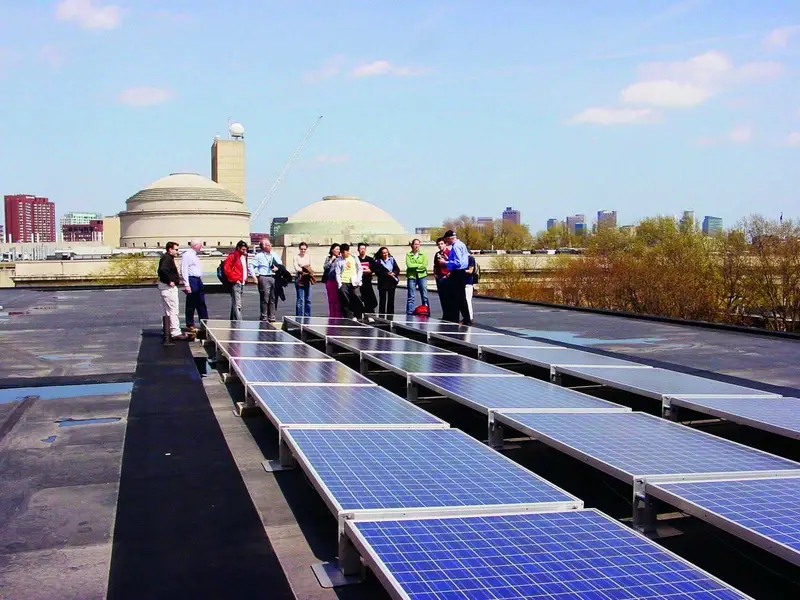
- Acceptance rate: 7%
- Average entry score: 155-170 GRE
- Student-to-faculty ratio: 18 to 1
- Estimated cost of attendance (tuition and fees): $33,056-$53,581
- Average earning potential for graduates: $103,100 (College Simply)
MIT’s energy program is a collaborative effort between industry, government, and academia. The initiative aims to accelerate innovation in clean energy technology by bringing together diverse groups of people who share their knowledge and expertise.
This institution has a well-established reputation for excellence in science and engineering. You can be confident that the program will provide you with an excellent education in these fields. MIT’s master’s programs in sustainable energy provide you with the knowledge and skills needed to address the world’s greatest challenges.
The program is designed to give you the tools for creating a sustainable future where people and nature thrive. You will learn about renewable energy sources, storage systems, climate change mitigation, and adaptation strategies.
What’s it like to study at the Massachusetts Institute of Technology?
#2. Princeton University

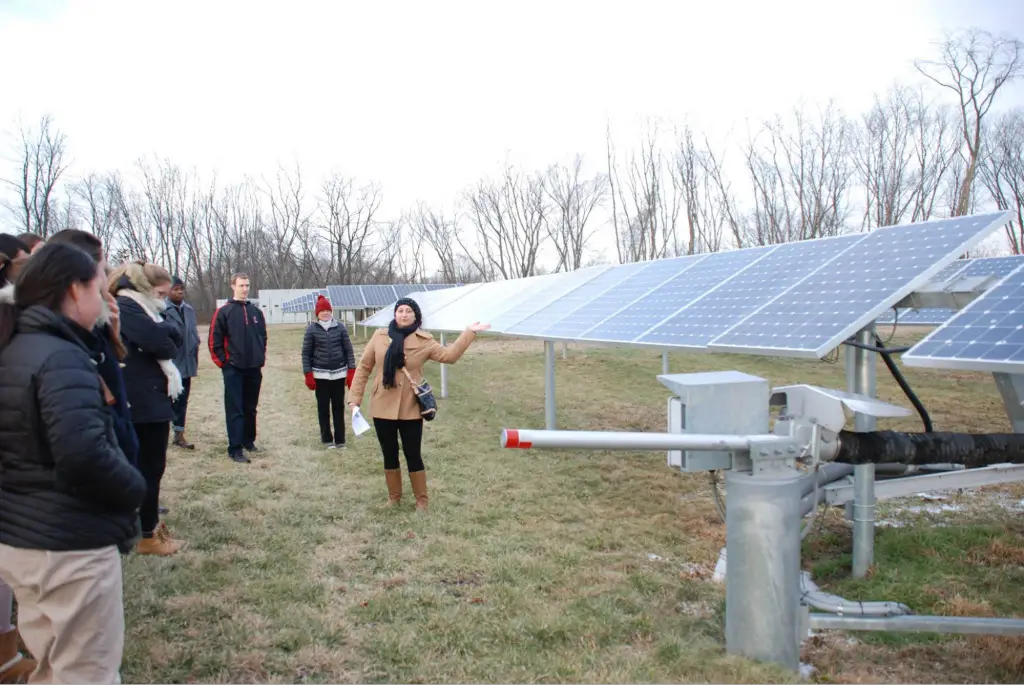
- Acceptance rate: 6%
- Average entry score: 161-163 GRE
- Student-to-faculty ratio: 5 to 1
- Estimated cost of attendance (tuition and fees): $78,490
- Average earning potential for graduates: $77,330 (NJ Spotlight News)
The university’s Andlinger Center of Energy and Environment offers courses in biofuels, sustainable design, geoengineering, solar energy, and more. These courses are available at certificate, undergraduate, and graduate levels.
Combined with Princeton’s vast collection of libraries and other resources, this center provides students with an exceptional learning environment that’s second to none.
Graduates boast over 80% employment rate. This is impressive, as many college graduates face difficulty finding jobs in today’s economy. They are equipped with the knowledge, skills, and experience they need to succeed in their careers.
What’s it like to study at Princeton University?
#1. Stanford University

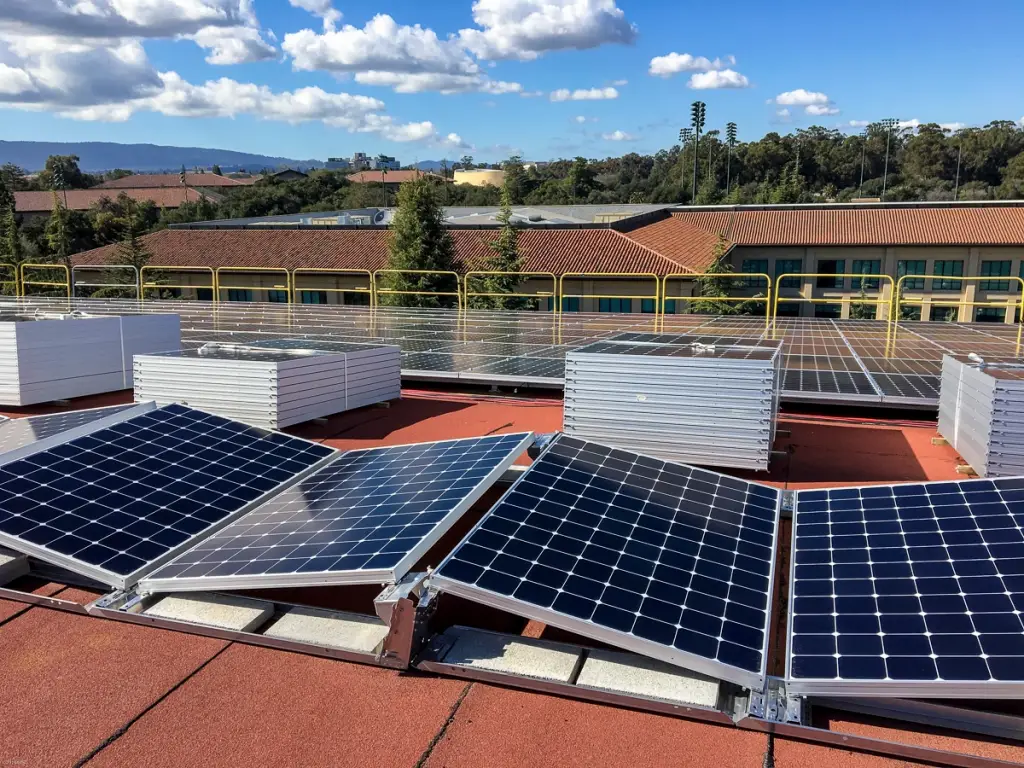
- Acceptance rate: 5%
- Average entry score: 166-172 GRE
- Student-to-faculty ratio: 5 to 1
- Estimated cost of attendance (tuition and fees): $78,898
- Average earning potential for graduates: $94,564 (Glassdoor)
Stanford offers a Master of Science in Energy Resources Engineering that focuses on integrating geoscience, engineering, and policy perspectives to understand the global environmental system. This graduate program was created for students who want to use their expertise in renewable energy or related fields.
Stanford University also brings together experienced scholars, students, and faculty to discuss the latest developments in energy.
This professional program is entirely online, so you can study from home or anywhere else with an internet connection. The online format also allows you to work full-time while earning your certificate.
What’s it like to study at Stanford University?
Conclusion
The world is in dire need of renewable energy professionals who can tackle the challenges of climate change and help build a sustainable future.
With cutting-edge facilities, expert faculty, and a strong emphasis on practical experience, these institutions are well-equipped to prepare the next generation of renewable energy leaders.
By choosing to study at one of these schools, you will be confident that you are receiving a top-notch education that will enable you to make a real impact in the world.
Selection Criteria
Here is a list of the factors we considered when selecting the best schools for renewable energy degrees:
Please note that the order in this list might vary by ranking criteria and sources.
- Reputation and ranking of the school: We looked for schools that have a strong reputation and high ranking in the field of renewable energy.
- Faculty expertise, qualifications, and specialization: We researched the faculty members and their areas of expertise and qualifications to ensure that the school has professors with relevant expertise and specialization in the areas of renewable energy that are of interest.
- Curriculum and resources: We evaluated the curriculum to ensure it aligns with students’ interests and career goals and considered the quality of the school’s facilities and resources, such as labs, equipment, and libraries.
- Opportunities for hands-on learning and research: We looked for schools that provide opportunities for hands-on experience through internships, co-op programs, or fieldwork.
- Student support services and alumni network: We considered the availability of support services and the strength of the alumni network in providing mentorship, internships, and job opportunities after graduation.
- Extracurricular activities and diversity: We evaluated the availability of extracurricular activities and clubs that align with students’ interests and considered the school’s diversity and inclusivity.
- Networking and post-graduation support: We researched the school’s network of alumni and their post-graduation support for geology students and also considered if the schools have a strong network of industry professionals and researchers in the field of renewable energy.
Frequently Asked Questions
Q1. What are the best schools for renewable energy degrees?
There are several universities and colleges around the country with excellent renewable energy programs.
Some of the best schools for renewable energy degrees in the United States include the Massachusetts Institute of Technology (MIT), Stanford University, the University of California-Berkeley, Georgia Institute of Technology, and the University of Michigan-Ann Arbor.
Q2. What degree programs are available for renewable energy?
Renewable energy degree programs typically fall under engineering or environmental studies. Bachelor’s, Master’s, and Ph.D. students can study Renewable Energy in a variety of degree programs at US colleges and universities.
Some universities offer special programs, such as Sustainable Energy Systems and Environmental Studies, with a focus on Renewable Energy.
Q3. How do I choose the right school for my renewable energy degree?
When you’re choosing the right school for your renewable energy degree, it can be helpful to consider several factors, such as program quality and faculty expertise.
You should also find out if the university has a good reputation for educating students on renewable energy. The percentage of its alumni who go on to work in that field is also a good indicator of the program’s quality.
Q4. What are the admission requirements for schools offering renewable energy degrees?
Most schools have certain requirements for admission, such as a high school diploma or GED and transcripts. Others may also require a portfolio or demonstrate technical skills. You should check with the school to see if you need to submit any additional documents.
Q5. Are there any scholarships available for students pursuing renewable energy degrees?
Yes, many scholarships are available for students pursuing renewable energy degrees.
The Renewable Energy Scholarship Foundation, The Clean Energy Scholarship Program, and The American Wind Energy Association are some of the scholarship programs that offer financial support for renewable energy students.
References
[1] Official Websites
[2] Salary Data from Glassdoor, Payscale; Salary.com, Zippia, among others
[3] Ranking references including news media such as Top Energy and Fuels Universities in United States and Best Renewable Energy Engineering Colleges in the US.


